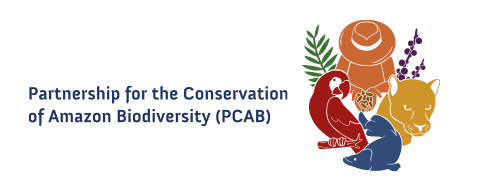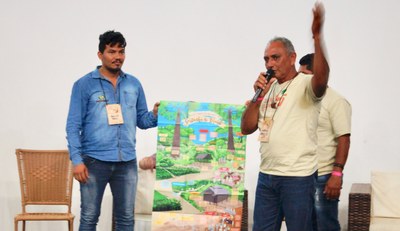Innovative technology package will help improve Brazil nut value chain
The Brazil nuts value chain has gained new tools to improve the quality of the product and the life of the families involved in the production. The SEMEAR Technology Package, produced by the Instituto Internacional de Educação do Brasil (IEB) under the SEMEAR collective,includes the “Castanhadora” mobile app, the "Good Practices in Practice" poster and video, the “Castanheiro Facilitator's Guide”, as well as a field notebook to be used during the harvest. Together, the materials will make it easier for producers to follow standards in nuts gathering – diminishing contamination and improving product quality. And also will improve their capacity to organize their finances, increasing gains and profits for the communities.
The package was launched at a SEMEAR seminar, in September, in Brasília, which brought together stakeholders from all of the Brazil nut value chain – from the extractivists to the companies that sell Brazil nuts to the final consumer, also including factories using the raw material for producing oil and cosmetics from Brazil nuts. The app was welcomed and approved by all participants. “It will be a hit among Brazil nut gatherers, locally known as castanheiros,” said Sávio Gomes, from Pacto das Águas, one of the developers of the platform. “It will meet the castanheiros’ needs because gathering is a family or individual process, and the tool will help them calculate their costs.”
SEMEAR Castanha is a collective network that brings together knowledge and experiences on Brazil nuts from different actors involved in its value chain, such as indigenous peoples, riverine communities, cooperative managers and civil servants from the states of Amazonas and Rondônia. It is formed by people that attended FORMAR Castanha, a two year training program delivered by the IEB and concluded in 2018 with a focus on continued training in sustainable value chains. In addition to FORMAR Castanha graduates, SEMEAR Castanha includes other partners, such as the Pacto das Águas, the Operação Amazônia Nativa (OPAN), the US Forest Service (USFS), and USAID, through the PCAB.
“At the end of FORMAR Castanha, the participants jointly drafted a wish list, and we are now seeing their dreams come true. The whole package was developed in a collaborative way over several months. Collaborative efforts created this exemplary package, which will be publicized and distributed in local communities. I am very happy to see the result of our partners' work,” added Ana Paula Mendes, Program Officer from USAID.
Discussing the Brazil Nut Market
The two day seminar was attended by approximately 100 people, focusing value chain bottlenecks, best practices, and prospects for the market.“USAID is committed to supporting links in tall value chains. We advocate sustainable development for the Amazon region as a whole, respecting traditional people, protecting the forest, and natural resources for future generations,” said Ted Gehr, USAID Director for Brazil, in the opening session.
The event had representatives from Brazil nut producing communities, civil society and cooperation organizations, such as the German Cooperation Agency - GIZ and from the private sector, like Natura and Wickbold. These companies that are sourcing Brazil nuts directly from the community. They discussed value chain links and access to capital and funding.
Natura’s Raoni Silva believes in collaboration to overcome processing bottlenecks and distribution irregularities. “Everyone needs to be involved in developing the value chain – no single actor can do it alone” says Silva
The Partners for the Amazon Platform (PPA), in which USAID acts as a catalyst and gathers private companies committed to organize value chains and develop sustainable development models, was introduced in the seminar. “The PPA bridges the distance between producers and companies," explained Alex Alves, USAID’s private sector engagement and partnerships analyst. Through its acceleration program, the PPA could also drive innovation in this sector.
The panels discussed bottlenecks in the chain – such as the seasonal nature of nuts gathering, logistical hurdles affecting distribution, and manufacturing quality standards. Some solutions were presented, like focusing on innovation and strengthening partnership networks. As said Costa, at the same time speakers in the seminar were talking about challenges, “people down there (in the audience), are acting behind the scenes to find solutions.”
Watch the panel broadcast on the IEB Facebook page.
Click here to access the SEMEAR technology package (in Portuguese).



